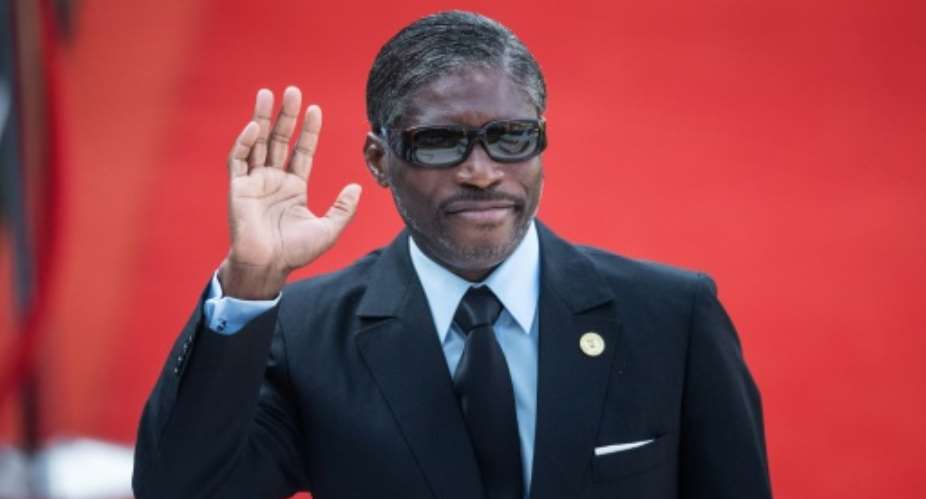The UN's top court will rule on Friday in a bitter row centred on a swanky Paris house seized by France as part of a corruption probe into Equatorial Guinea's vice president.
The central African nation dragged France to the International Court of Justice (ICJ) four years ago after French police raided the luxury mansion in 2012, in a probe into Teodorin Obiang.
Equatorial Guinea insists the property is its diplomatic mission in Paris, but France says it is merely the home of Obiang, 52, who is also the son of iron-fisted President Teodoro Obiang Nguema.
French prosecutors accused the younger Obiang of plundering tens of millions of dollars from the oil- and timber-rich African nation's coffers to fund his jetset lifestyle in France.
Teodorin Obiang was handed a three-year sentence and a 30,000 euro ($36,200) fine, both suspended, in 2017 for corruption and money laundering. The sentence is under appeal in France.
In 2016, lawyers for Equatorial Guinea went to the Hague-based ICJ, the world's legal referee in disputes between countries, to order France to stop Obiang's criminal prosecution, arguing that he had immunity.
They also asked judges to rule that France broke treaty rules which safeguard diplomats from interference by a host country when they seized the six-storey mansion in one of the French capital's most sought-after neighbourhoods.
'Very powerful'
In 2018 ICJ's judges in a preliminary ruling said they did not have jurisdiction to deal with any claims against Obiang's criminal prosecution in France.
However, the ICJ said it could rule whether France was within its powers to confiscate the property.
Significantly the ICJ's judges also earlier told France to treat the property as a diplomatic mission pending the outcome of the final judgement.
Legal experts agreed that a ruling in favour of Equatorial Guinea could harm France's long-term attempts to bring groups and individuals to book for misappropriating public funds at home and then stashing the proceeds in France.
"If France loses the case, it is a setback to France's unilateral capacity to prosecute corrupt rulers," said Geoff Gordon, a senior researcher at the Asser Institute in The Hague.
Cecily Rose, an assistant professor of public international law at Leiden University, however said a judgement in favour of Malabo "would mean that France would just be a bit more careful or cautious" about how it designates diplomatic premises.
"It's also worth noting that this case advertises the fact that France is a sort of leader in the anti-corruption fight... That's very powerful, and could lead to some very interesting public interest litigation concerning corruption in the future," she said.





 Former Kotoko Player George Asare elected SRC President at PUG Law Faculty
Former Kotoko Player George Asare elected SRC President at PUG Law Faculty
 2024 elections: Consider ‘dumsor’ when casting your votes; NPP deserves less — P...
2024 elections: Consider ‘dumsor’ when casting your votes; NPP deserves less — P...
 You have no grounds to call Mahama incompetent; you’ve failed — Prof. Marfo blas...
You have no grounds to call Mahama incompetent; you’ve failed — Prof. Marfo blas...
 2024 elections: NPP creates better policies for people like us; we’ll vote for B...
2024 elections: NPP creates better policies for people like us; we’ll vote for B...
 Don’t exchange your life for wealth; a sparkle of fire can be your end — Gender ...
Don’t exchange your life for wealth; a sparkle of fire can be your end — Gender ...
 Ghana’s newly installed Poland train reportedly involved in accident while on a ...
Ghana’s newly installed Poland train reportedly involved in accident while on a ...
 Chieftaincy disputes: Government imposes 4pm to 7am curfew on Sampa township
Chieftaincy disputes: Government imposes 4pm to 7am curfew on Sampa township
 Franklin Cudjoe fumes at unaccountable wasteful executive living large at the ex...
Franklin Cudjoe fumes at unaccountable wasteful executive living large at the ex...
 I'll 'stoop too low' for votes; I'm never moved by your propaganda — Oquaye Jnr ...
I'll 'stoop too low' for votes; I'm never moved by your propaganda — Oquaye Jnr ...
 Kumasi Thermal Plant commissioning: I pray God opens the eyes of leaders who don...
Kumasi Thermal Plant commissioning: I pray God opens the eyes of leaders who don...
